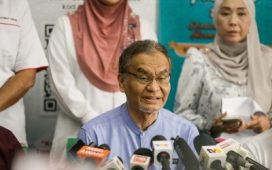The leader of Portugal’s centre-right Democratic Alliance, Luis Montenegro, has claimed victory after a closely contested parliamentary election that saw the far-right surge.
With almost 99% of Sunday’s votes counted, the Democratic Alliance – an electoral platform made up of the large Social Democratic party (PSD) and two smaller conservative parties – and the Socialist party (PS) were each on 28.67%.
The far-right Chega party was in third place with 18%.
In the early hours of Monday, Montenegro reiterated his election promise not to rely on Chega to govern or to strike any deals with the populists, although it was unclear if he could govern without their support.
Montenegro told a crowd of cheering supporters it was crucial for political parties in the new parliament to act responsibly and “comply with the wish of the Portuguese people”.
“I always said that winning the elections would mean having one vote more than any other candidacy, and only in those circumstances would I accept to be prime minister,” he said in an address to party supporters shortly after midnight.
“It seems inescapable that the AD won the elections and that the Socialists lost,” he added after partial official results showed his side secured a slim lead over the Socialists, in power since 2015, in Sunday’s polls.
The leader of the Socialist party, Pedro Nuno Santos, conceded defeat and congratulated the Democratic Alliance on its victory.
“Everything indicates that the result won’t enable the Socialist Party to be the most voted party,” Nuno Santos said, according to Bloomberg.
The result marked a huge surge for Chega, which was founded five years ago by André Ventura, a former TV football pundit who was once a rising star in the PSD. The party broke through in the 2019 election, attracting 1.3% of the vote and gaining its first MP in Portugal’s 230-seat assembly. Three years later, it took 7.2% of the vote and won 12 seats.
The vote was triggered by the socialist prime minister, António Costa, resigning in November after an investigation was launched into alleged illegalities in his administration’s handling of large green investment projects.
Costa – who had been in office since 2015 and who won a surprise absolute majority in the 2022 general election – has not been accused of any crime. He said that while his conscience was clear, he felt he had no choice but to step down because the “duties of prime minister are not compatible with any suspicion of my integrity”.
He also announced that he would not be running for prime minister in the election, leaving the Socialist party in the hands of Nuno Santos, a former infrastructure minister from the leftwing of the party.
Speaking as the results came in, Costa acknowledged his party’s performance was “far from the one we had two years ago and far from the one we had wanted”.
Although Montenegro, has explicitly ruled out any deals with Chega because of what he calls Ventura’s “often xenophobic, racist, populist and excessively demagogic” views, he is now likely to come under considerable pressure from his own party to reach an agreement with the far-right party to help the PSD into government.
Even with the backing of the smaller centre-right Liberal Initiative – which is on course to finish fourth on around 4.9% – any potential minority government led by the Democratic Alliance would probably still have to rely on Chega’s support to pass legislation, leaving its stability in the hands of the far right.
According to the Expresso newspaper, Portugal’s president, Marcelo Rebelo de Sousa, has broken with the convention of presidential neutrality by saying he will do everything possible to prevent Chega from reaching office. He said he would reject any moves to replace Montenegro as prime minister should the right win a majority.
Ventura has hit back at the president’s comments, saying: “In Portugal, it’s not the president of the republic who chooses the government – it’s the voters.”
As the night wore on, other European far-right leaders were quick to toast Chega’s success and offer their support and solidarity.
after newsletter promotion
Santiago Abascal, the leader of Spain’s Vox party, congratulated Ventura and “our Portuguese friends and neighbours” on “this great result”, while Maximilian Krah, Alternative for Germany’s leader in the European parliament, said Chega was on the way to a “fantastic success”.
Jordan Bardella, the president of France’s National Rally, hailed a “great breakthrough”, saying the Portuguese people were “defending their identity and their prosperity, and sweeping away the corrupt socialists!”.
In Hungary, Ádám Samu Balázs, the head of the international secretariat for Viktor Orbán’s Fidesz party, called the results a “great breakthrough”. He added: “The fight of our friend and ally André Ventura against the globalist left and for the protection of national sovereignty and the defence of Europe is exemplary.”
The Socialists had been hoping the threat of the far right moving closer to government would rally centrist voters as it did in 2022. The Democratic Alliance, meanwhile, had offered the prospect of change after eight years of socialist rule, promising to promote economic growth by cutting taxes and improve squeezed public services.
Chega had sought to capitalise on widespread dissatisfaction with Portugal’s mainstream left and right parties as the country continues to suffer a housing crisis, stressed health and education systems, and low wages.
“Never in the history of Portugal has there been a greater possibility of overthrowing the bipartisan system that has been killing us for the past 50 years,” Ventura told supporters at a recent Chega rally in northern Portugal. “We have never been this close.”
The party had made political corruption a central theme of its campaign, putting up huge billboards around the country reading: “Portugal needs a clean-up.”
The investigation that caused the collapse of Costa’s government – which examined possible “malfeasance, active and passive corruption of politicians and influence peddling” – led to searches of the environment and infrastructure ministries and of Costa’s official residence, and to the arrest of five people, among them his chief of staff. The five were subsequently released and the investigating magistrate retained only the charge of influence peddling.
It is not the only scandal dogging the Socialists. The former prime minister José Sócrates is due to stand trial over allegations that he pocketed €34m from three companies while he was in power between 2005 and 2011. Sócrates has denied any involvement in fraud or money-laundering and has maintained his innocence.
The PSD is also facing corruption allegations, with two prominent party officials in Madeira resigning recently amid a graft investigation.
Reuters contributed to this report















